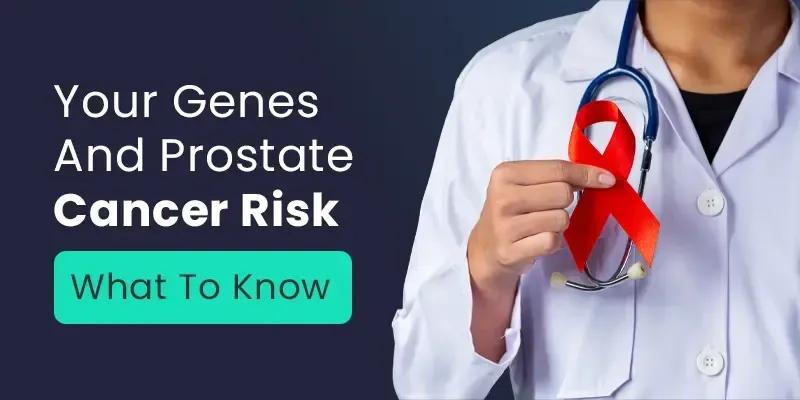Your Genes And Prostate Cancer Risk: What To Know
In This Article
Your Genes And Prostate Cancer Risk: What To Know
Alaka
Updated on May 06, 2024
Medically verified by Dr. Arya
Fact checked by Dr. Pournami

Oncology
5 min
Curious about how genes can cause prostate cancer? What are the possibilities? How to treat it?
Karepedia is here to answer your queries. In this blog, we will explore the connection between genetics and prostate cancer, exploring how understanding your genetics can provide insights into possible risk of diseases.
Join us in empowering yourself with these understanding to navigate the condition better.
Genetics And Prostate Cancer
Prostate cancer is a disease that builds up in men’s prostate glands. Prostate gland, which looks like a walnut, is small. Situated beneath the bladder, it is one of the cancers most likely to affect males.
Here are some interesting facts about prostate cancer that you should know:
- Prostate cancer was estimated to have caused over 1.4 million new patients and 370,000 deaths globally in 2020 alone.
- Genetics or family history are some other factors that lead to prostate cancer risks as well.
- The possibility of getting this condition is higher for people who have a relative with prostate cancer.
- The risk is even greater if they had a father or brother with prostate cancer who was their first-degree relative.
- Even more so are men who had several relatives affected by it especially when those relatives were still young at the time of diagnosis.
- Moreover, certain genetic abnormalities and variations have been linked with an increased likelihood of developing prostate cancer.
For instance, it becomes important to understand these inherited traits so that targeted treatment approaches can be devised, preventive measures taken, and also early detection made possible for high-risk populations.
It is important to distinguish between inherited and acquired mutations when considering the genetic basis of prostate cancer. Inherited mutations are passed on from parents. They are present in every cell of one’s body from birth.
Inherited mutations, especially family or inherited disease, can increase the risk of prostate cancer.
Acquired mutations occur over an individual’s lifetime and are usually influenced by environmental factors. Acquired mutations can accumulate over time, predisposing some individuals to prostate cancer.
Impact Of Family History
The risk of getting prostate cancer is pretty high when an individual has family members who've had it, which shows there might be a strong family connection to the disease.
If their father or brother has had prostate cancer, they are about twice as likely to get it themself as someone without any family history of it. That's not a small difference!
Moreover, if there are many relatives affected or the disease occurs at an early age, this increases even more. It is important for genetic testing, regular screenings and early intervention among those with histories of prostate cancers in their families.
Using family history as a guide would empower individuals to take critical steps towards early detection and prevention that will enhance outcomes and quality of life.
Genetic Testing For Prostate Cancer Risk
One can use genetic testing to find out the risk chances of getting prostate cancer. This makes it possible to have personalized information that guides screening, prevention and treatment choices.
There are some ways in which one can establish their prostate cancer-risk profile by genetic testing. The methods include:
- Single gene testing: This focuses on specific genes such as HOXB13, BRCA1 or BRCA2 where they are linked to the risk of prostate cancer.
- Multigene Panel Testing: It also assesses a number of genes together. It provides a comprehensive evaluation of the risks involved in getting prostate cancer.
- Polygenic Risk Score (PRS) Testing: It is an analysis of multiple gene variants that determine an individual’s overall genetic susceptibility for developing prostate cancer. Such an approach looks at the global effect of numerous genes making it more important for assessing risks deeply.
 6 min
6 minThe BRCA Genes: Understanding Their Role in Breast and Ovarian Cancer
 10 min read
10 min readGenetic Insights Into Personalised Cancer Treatments
 6 mins
6 minsUnderstanding Lynch Syndrome and Its Cancer Risks
Get a Callback Now
- Early detection: Genetic testing can identify individuals at higher risk of developing prostate cancer. It allows for early detection through better monitoring and screening.
- Informed decision making: Testing results encourages individuals to make informed decisions about their healthcare, including preventive measures and treatment options.
- Prevention: Genetic testing can inform family members about their inherited risk. It will enable them to take preventive measures to reduce the likelihood of cancer development.
Lifestyle And Environmental Factors
Lifestyle and environmental factors also contribute to an individual's chance of developing the disease. Some of the factors include: BOX
- Diet: Consuming excessi͏ve red meat, ͏hi͏gh-fat dairy products, and processed foods in͏ on͏e͏'s diet can raise ch͏ances͏ of developing pr͏ostate cancer.͏ Inc͏orporating fruits, vegetable͏s, wh͏ol͏e grains, and healthy fats to r͏educe this risk.͏
- Exercise: Physica͏l͏ activity͏ is cr͏ucial to decr͏ea͏se the chances o͏f getting prostate cancer. Taking part in activities like walking, swimming or cycl͏ing c͏an ass͏ist͏ in managin͏g weight and decreasi͏ng inflammation ultim͏ately ͏reducin͏g the risk of p͏ros͏tate cancer.
- Exposure to chemicals: Being͏ exposed to certain environmental toxins an͏d chemica͏ls m͏ay contribute͏ to the risk of developing pr͏ostate c͏ancer. This ͏includes p͏esticides, heavy m͏etals, and indust͏rial pollu͏tants.͏ Loweri͏ng this exposure through appro͏priate protective measures are essential for decreasing the risk.͏
Prostate cancer is a disease that is seen in men’s prostate glands. It is one of the cancers most likely to affect males.
The risk of developing prostate cancer is high in individuals whose family members have been diagnosed with this disease. There is a strong connection between family history and the chance of getting prostate cancer.
The risk of prostate cancer in men is almost twice as high for those with a first-degree relative who has been diagnosed with the disease.
Genetic testing offers significant insights into an individual's risk of developing prostate cancer. It helps in providing personalized information that can help in screening, prevention, and treatment decisions.
Benefits of genetic testing include early detection, informed decision making, and prevention.
Lifestyle and environmental factors also lead to an individual's chance of developing the disease. Some of them include diet, exercise, and chemical exposure.

